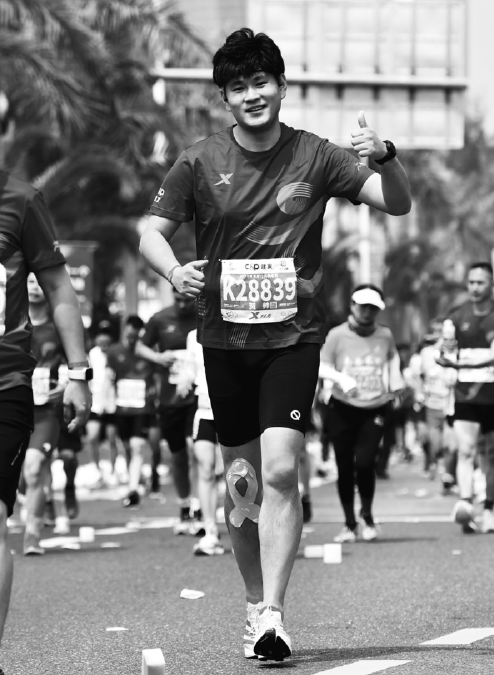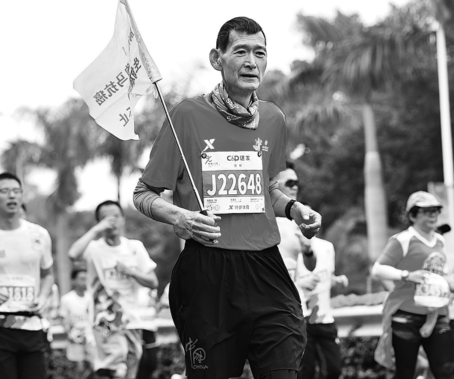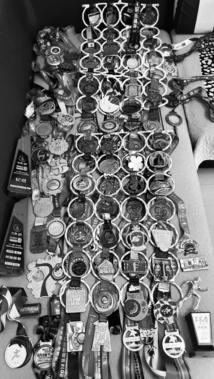Fulfilling the impossible dream
After losing his father to cancer, amateur runner He Shuai resolved to complete his dad's 100-marathon mission

He Shuai's vision was blurry from the tears. He felt thrilled and relieved when he crossed the finish line at the 2023 Xiamen Marathon on Sunday, just over three years since his late father had completed his 61st and final marathon on the same course.
His time of five hours and 40 minutes was far from elite, though it mattered little to He Shuai.
"Dad, I've completed a marathon and your dream now lives on, did you see?" an emotional He Shuai said after the race. "It's the best way to remember him."
He Shuai never thought of becoming a marathon runner. In fact, he used to be an unfit and inactive person. The 33-year-old took up running in 2020 after the passing of his father, He Ming, who had vowed to complete 100 marathons despite being a stage-4 lung cancer patient.
He Ming finished his 61st and last marathon on Jan 5, 2020 — his 57th birthday — in Xiamen, Fujian province. Five months later, he died after battling cancer for four years.
Now, his son has picked up the baton.
Shock diagnosis
In his wife Zhang Liling's eyes, He Ming was an outspoken and forthright man. Standing 1.87 meters tall, he used to be a fashion model. He also loved playing guitar and singing Teresa Teng songs.
In April 2016, shortly after He Ming retired from a security management agency in his hometown in East China's Anhui province, he received shocking news — a medical check revealed he had stage-4 lung cancer and doctors told him he had just three months to live.
"At the beginning, he stayed awake for nights, anxiously researching information about his illness online," Zhang Liling recalled.
He Ming soon came to terms with his diagnosis, putting on a brave face in front of people while seeking ways to improve his chances of survival.
Yet still, initial cycles of chemotherapy left him in extreme fragility and pain. His face was puffy, his back full of pustules, and he could barely do any physical work or even climb a set of stairs alone.
As conventional treatment could not cure his cancer, He Ming resorted to physical activities. "Lying on the hospital bed day and night is no different from waiting for death to come," he told his wife.
He Ming began by trying to stand up until he could walk. Walking then transitioned into jogging, which eventually turned into running.
Six months passed and, against all the odds, He Ming's body was recovering, which strengthened his resolve to keep exercising.
He Shuai reckons an encounter with a group of amateur runners during a day out on Shungeng Mountain inspired his father to take on marathons.
"I think he was impressed by the vitality of those runners," said He Shuai.
After that, He Ming's lean figure was regularly seen running along the trail of Shungeng Mountain, a popular route for amateur runners. He then became well-known among fellow runners of the Huainan Marathon Association — for his illness as well as his training intensity.
"Many of us were amazed by He Ming's tenacity, as he had a running session in the morning and evening, with a daily total of about 30 kilometers. He never stopped training, except for rainy and snowy days," said Liu Kaifu, president of the Huainan Marathon Association.
Initially, Zhang Liling and He Shuai both opposed He Ming's running regime. "I told him again and again, 'You are overburdening your body. It harms your immunity. Your body cannot take it,'" said Zhang.
"But he turned a deaf ear, repeating the same words, 'I know my body.'"
Inspirational figure
In October 2017, He Ming completed his first ever half-marathon in Huainan. His family didn't even know about it beforehand.
"We learned about it only a couple of days later," He Shuai said. "My mom was so worried that they had a quarrel, but he argued, 'I'd rather die on a marathon course than on a hospital bed.'"
He Ming's doctor, Xie Jun, was also taken aback. "For a patient with stage 4 cancer, sitting still hurts, let alone running marathons," Xie said. "He was so different from other patients. He had an extremely strong willpower, a powerful aspiration."
But few knew that He Ming always brought painkillers with him wherever he was running, according to He Shuai.
The following year, He Ming went on to run marathons in nearby cities and later traveled to other provinces.
In July 2018, He Ming's story grabbed the media's attention at the Guiyang Marathon. He realized he could inspire others to overcome adversity and create miracles.
From then on, he always donned T-shirts at races bearing the slogan: "Running marathons to battle cancer; Never stop running until I die".People from across the country got in touch to express their respect and support for He Ming, hailing him as a warrior, and more people — many fellow patients — became inspired to run marathons.
Unfortunately, a reexamination in 2019 found the cancer had recurred and spread to his bones. He Ming was determined to continue running and wanted to squeeze in as many races as he could.
"My father calculated carefully his chemo dates and designed his race plans. Sometimes he went on a trip for a marathon just one day after being discharged from the hospital," said He Shuai.
On Jan 5, 2020, He Ming completed his 61st marathon in Xiamen.
He Ming's condition, however, deteriorated rapidly days after he returned home and he was hospitalized. This time, he couldn't get his strength back as the cancer had spread to his brain and eventually took his life.
Even during his final days, He Ming tried his best to train in the hospital until he couldn't stand up. "How I wish I could run one more marathon or half-marathon!" read the last post on He Ming's Wechat Moments timeline.
Picking up the baton
For He Shuai, his father was not only a determined warrior but also a kind person.
He Ming donated blood regularly until he was struck by cancer, so unsurprisingly, he signed up as an organ donor for the Red Cross Society of Anhui province in 2019. At first, his wife and son were adamantly opposed, but as usual He Ming stuck to his guns.
"Apart from running marathons, the other thing he mentioned the most was his plan to donate his organs," said He Shuai.
"He often said that many people, including strangers, offered to help him after he was diagnosed with cancer, so he hoped to give back to society as much as possible."
Finally, He Ming's family granted permission for his organ donation. The day after his death, two patients received transplanted corneas and regained their eyesight.
He Shuai was always too shy to express his love for his father. The only time he can recall hugging his dad is when he was confined to the hospital bed during his final hours.
"I used to dislike running, as I was busy with work. Now I really regret that I never ran a marathon with my father," said He Shuai.
Days after He Ming's funeral, He Shuai decided to complete his father's mission by running the 39 marathons on his bucket list.
First, though, there was a big hill to climb. He Shuai was winded even after walking a few hundred meters along the Shungeng Mountain trail, let alone running. After a few weeks of regular jogging, though, he gradually built up his physical fitness.
In September 2020, He Shuai ran his first virtual half-marathon. Two months later, he completed his first full marathon in Nanjing.
The 2023 Xiamen Marathon was only the second full marathon race that He Shuai has completed.
He Shuai suffered from leg cramp midway through Sunday's race and at one point was even on the verge of quitting.
"I thought of my father running along the same course as if he was cheering me on and saying to me 'Son, you can do it.' So I managed to hold on," said He Shuai.
"After going through all of this, I'm even more impressed by the strength of my father. As a son, I feel so unspeakably proud of him."
Xinhua



Today's Top News
- Economic stability a pillar of China's national security
- Xi taps China's deep wisdom for global good
- New rules aim for platforms' healthy growth
- Chinese web literature grows overseas
- Postgrad exam trend points to thoughtful approach
- World's highest urban wetland a global model






























